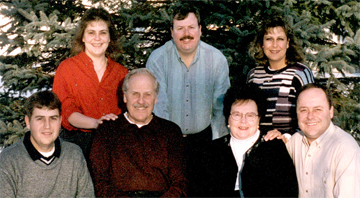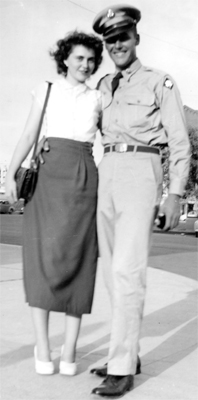
Don & Joyce (Hendricksen) Zubrod - Elpaso, Texas September 1952

Corporal Donald P. Zubrod was inducted into the Army in May of 1952. Upon finishing his training at Fort Bliss, Texas, Don was sent to Thule, Greenland, where he served as an Integrated Fire Specialist with the 429th AAA Battery and also was a Radar Technician with an Anti-Aircraft Unit. Don was discharged at Fort Sheridan, Illinois, on June 3, 1954, receiving the National Defense Service Medal.
Don Zubrod came from Templeton originally and started in the TV business in Manning. His parents were Louis and Louise Zubrod. Louis grew up on a farm in Nebraska, and farmed with Louise their entire married lives. The Zubrod farm was two miles south and one and a half miles west of Templeton. The farm place is gone now.
Don graduated from high school in 1949 and went to work for Oaken Construction until 1952, when he was drafted into the Army. Don recalls, "Like many others, I received a letter from our friendly government." Don was sent to El Paso, Texas, to go to Radar School. When he graduated, it was 110 degrees, and was told he was going to be shipped to Thule, Greenland, at the North Pole where it was 60 degrees below zero. They were fitted for Arctic clothing in El Paso, in the 110 degree heat. The clothes were flown to the base and waiting for them when they got there.
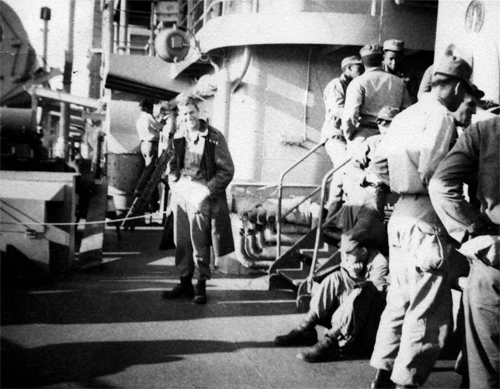
They took a train to New York City, got on a ship and went past the Statue of Liberty, and on up to Thule. They went past huge icebergs hundreds of feet tall. "We'd snake through these icebergs to get there. It was really something to see!" Don continues, "We got up in the bay and they took us by boat to the shore. It was real light out although the sun wasn't shining. It was so light and we didn't have anything to do, so we decided to play football. We used a canteen for a football since we didn't have one. When we shipped out a year later, four of us were playing cards because we couldn't sleep. And after midnight, someone said, "'We're going home today.'" And a little while later, I went to pull the shade because the sun was shining in our eyes - after midnight. It was daylight 24 hours a day during the summer months and during the winter time it was pitch black at dinner time."
They had barracks like motel rooms and each soldier had his own room and was very nice for them. Don forgot how many rooms were in one of those buildings. There is 16 feet of permafrost at Thule, and not a blade of grass or trees could grow. The buildings had no footings because of the permafrost, so they were built on cement blocks and held down by heavy cables because of the terrifically high winds which could gust up to 100 miles an hour. If the buildings had been built right on top of the ground, the heat from the buildings would have melted the ice.
Those wind storms would come up, all of a sudden and could last up to two days. Wherever the men were, in a building, at church, at a movie, they would have to stay there. They had food in every building because it was impossible to move between buildings during these wind storms. Don remembers one such storm, "With winds up to 100 miles an hour, if you would open a door, it was just like opening it up to a wall. You couldn't see anything. You couldn't go out in it either. We could be stuck in one place for a couple of days. One time, three others guys and myself really did a stupid thing. We were at a movie and while we were there, one of those winds had come up. There are three stages of these winds - stage one, two, and three. We were told that a stage three wind (100 miles an hour) had come up and we were to stay put. Well, we watched about three movies and by then, we wanted to go back to our rooms. The four of us started out and within 3 minutes, I wished we had never started. You couldn't walk, you couldn't breathe and you couldn't see anything. We only had to go about a block. You could see a dim light every once in while and by the time we reached our building, we had snow blown completely through our clothes. We're lucky we made it! Sometime later, one guy didn't make it. They found him dead outside. We should never have been out there! The next day our commander called us in and chewed our butts! He told us we could lose our stripes, you could lose everything."
The buildings were heated by a central building on the base and they piped the heat to each structure. These above ground tubes were 3 or 4 feet and carried the heat to each building. A vent could be opened or closed in each room by the individual to meet their own comfort zone. These pipes were so big that step ladders were needed to get over them so you could move around the base."
The water was hauled in by truck from a lake up in the mountains. The base is at the bottom of this mountain. They had anti-aircraft guns surrounding the mountains to protect the base - actually from Russia, because it was so close. Don remembers water rationing, "Our water came from a lake up in the mountains and sometimes weather prevented their getting a truck up there. Then we were put on water rationing, we couldn't shave and had very short showers."
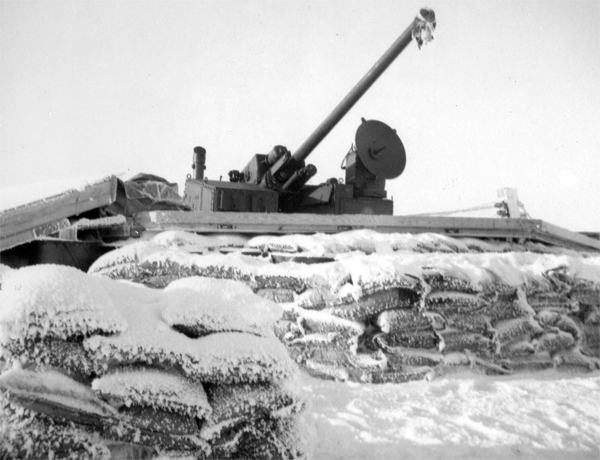
They had gun sights out on the mountains and Don was a radar technician. "I didn't belong to a gun crew but I just fixed the radars. I wasn't on a crew but once in a while I would get stranded out at one of these gun sites. And it's kind of interesting, because every plane that left the United States to fly up to Thule had to be on a certain corridor. Where ever that is. And if you were off that corridor, you were unfriendly. So they would say there was an unidentified aircraft coming in and they would send a jet up to read the serial number off that plane. The jets would take off right out of the hangar, didn't even have to warm up, would shoot right up. They would radio the gun crews that there was an unidentified aircraft coming, they were called bogies. "There's a bogie comin'." And when it got within 25 to 50 miles and still wasn't identified, it was rated a bandit. So these gun crews, had to uncover the gun (it was kept covered because it was so cold), and there was a little shack for the shells to keep them warm, and then they had to turn on the radar. There were two types of radar which took about 5 minutes to warm them up. Then they would load the gun and would get on the radio and say, '"We're tracking the bandit and we are ready to fire.'" Then they would hear that the plane had been identified! So then the gun crew would have to unload the gun, turn off the radar and put everything back! They might do this 3 or 4 times a day, including nights. Sometimes they would get a call at 3:00 in the morning. So they called 'wolf' once too often. And pretty soon the leader of the group said, '"Let's not uncover the gun today."'
Don continues, "I was stranded out with the radar unit one night. There were bunks where you could sleep and up front was the office. I woke up and there was one of the crew up front in his long underwear. He was on the radio and I heard him say, "'We're tracking a bandit and we're ready to fire.'" Everybody in that place was sleeping! And that's the truth! They'd called "wolf" too often. After months of that, they just said, "'To hell with it! It will just be identified anyway!'"
During Don's time there, they never had to shoot at any plane. Don remembers, "One time the Russians sent over 300 planes or so towards Thule. We were ready to fire then, but it was just a practice mission, I think. They turned off. We knew they were coming because they had been picked up on the radar. Mine was a sky sweeper, fast firing low gun. We could handle the jets and stuff. I had my own jeep driver and sometimes, in the middle of the night, I would have to go up in the mountains to work on the radar. Sometimes a storm would come up so that I couldn't make it back to the base, and I had to stay out there. There was lots of food out there. We were never short of food. We fixed our own food. If you wanted a steak, you just threw it on the grill. We had all kinds of food."
They had 90MM guns around the base called "sky sweepers" which would fire at the small jets flying over. They could handle a fast flying jet with that gun and at that time it was the best gun made but it's nothing compared to what they have now. Don remembers, "It was a tube type, it had tubes in it instead of transistors. I later went to Chicago for a year - to TV school."
Don was at Thule for one year, and during this time his son, Brad, was born. When Don first saw Brad, he was just about walking; he was ten months old when Don got home. You couldn't call home from Thule, and they had mail delivered about twice a week. They never had any R&R and didn't go home for Christmas or other events. They wrote letters to pass the time and one person Don wrote to was his brother: "Merlyn was stationed in Alaska. He was in Fairbanks, and his wife was with him. They really liked it in Fairbanks and their son, Randy, was born there. They were planning to move back to Fairbanks after Merlyn got out the service but his wife got sick and passed away, so he never moved back."
There were 5 or 6 thousand men in Thule and only 3 women; one was Christine Jorgensen. "I'll never forget her" Don remembers. "She went to the Catholic Church. She would go to communion every time. And she would come back from communion, in a sweater or something, and all these guys eyes were on this one woman."
Every couple of months a whole tribe of Inuit (also called Eskimos) would come to the base. Don recalls, 'We would stand and look at them and they would look at us. They were terrible looking - teeth missing and everything. I don't know why they were there, but all of sudden there they were. I really don't know how they survived in that weather. We could hardly live in it. It is amazing! There would be men and women and dogs. And every once in while, we would see an Eskimo dog running around with half a collar. It would have gotten loose somehow. We never saw the Eskimos other than when they would show up at the base. The base being there was kind of bad for the Eskimos, I think. There was so much noise created by the aircraft that whatever wildlife was there moved away, making it even more difficult for the Eskimos to go about their normal lifestyle."
The Thule camp was about 150 miles from the true North Pole, and the compasses didn't work right. The winters were very depressing for the men - it was pitch black 24 hours a day. Then as the season started to change, they would start seeing the sun for maybe a minute or two. Everyone would ask if you had 'seen' the sun today. At first you would see it shining on the bottom of an airplane which would be a big deal after being in darkness for so long. The sun itself would not be visible at first and then all of a sudden, there it was going round and round giving them 24 hours of daylight. "It never went down. It was just as bright at midnight as it was at noon," recalls Don. "The continual darkness in the winter was depressing. During our spare time, it was up to us to keep our spirits up. We played cards and went to movies. We bought some little race cars and raced them up and down the hallways. We just killed time!"
Because Don's job was radar repair, he never had a work schedule. He went to work when there was a problem with the radar-day or night. The 7-man radar crews had work schedules 24/7. They took care of the guns, and Don's job was to fix the radar units. They had to do radar checks everyday to make sure everything was working all right. Then Don was done for the day, except sometimes they would wake him up and he would have to go out during the night.
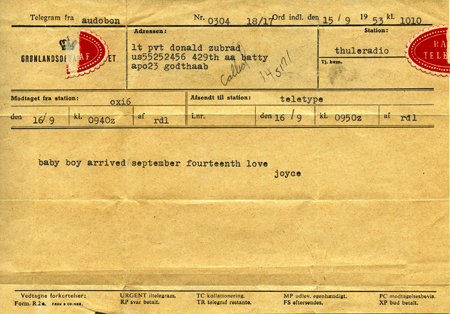
The missing Dog Tags:
One day Dave Kusel was cleaning out their garage and ran across a partially
broken container which was an old sewing box. Dave took out the top tray and
looked into the bottom. There was a mass of needles, thread, and other small
sewing type items all mixed together. He didn't want to stick his finger to
move those things around in the bottom and was about to throw it away when he
noticed something silver and shiny in the bottom corner. So Dave slid the needles
and thread over a little and was completely surprised to see it was a dog tag.
He carefully picked it up next to the needles and to his total amazement the
name read "Zubrod, Donald P. US55251856, T5253
A." Dave dug around farther in the box and found a second dog tag that belonged to Don.
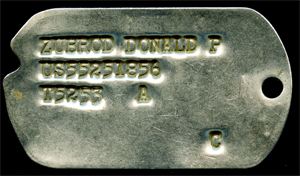
Dave thought he would have a little fun with Don so he caught up with him at Rix Amoco a day later. He reminded Don about the Veteran project, and then asked him if he could find his dog tags so they could be scanned and used in a Monitor article to help promote the upcoming Veterans' history book project. Don exclaimed "I don't know where they would be anymore."
Then Dave grabbed those 2 dog tags out of the pocket of his T-shirt and handed them to Don. Don asked whose tags they were and Dave quipped "look." Glancing at them Don said "these aren't mine!" and Dave asked "what does the name say?" Don exclaimed "These are my dog tags! - where did you get them?" After explaining the whole story to Don he then asked if he could have them. Dave said "of course - they are yours!"
